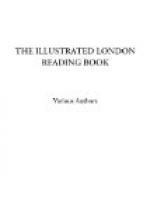[Illustration]
For the clear
waters to pursue their race
Without restraint. How
swiftly have they flown—
Succeeding, still succeeding!
Here the child
Puts, when the high-swoll’n
flood runs fierce and wild,
His budding courage
to the proof; and here
Declining manhood learns to
note the sly
And sure encroachments of
infirmity—
Thinking how fast
time runs—life’s end how near.
Wordsworth.
* * * * *
HUMANITY.
During the retreat of the famous King Alfred at Athelney, in Somersetshire, after the defeat of his forces by the Danes, the following circumstance happened, which shows the extremities to which that great man was reduced, and gives a striking proof of his pious and benevolent disposition:—A beggar came to his little castle, and requested alms. His Queen informed him that they had only one small loaf remaining, which was insufficient for themselves and their friends, who were gone abroad in quest of food, though with little hopes of success. But the King replied, “Give the poor Christian the one half of the loaf. He that could feed live thousand with five loaves and two fishes, can certainly make that half of the loaf suffice for more than our necessities.” Accordingly the poor man was relieved; and this noble act of charity was soon recompensed by a providential store of fresh provisions, with which his people returned.
Sir Philip Sydney, at the battle near Zutphen, displayed the most undaunted courage. He had two horses killed under him; and, whilst mounting a third, was wounded by a musket-shot out of the trenches, which broke the bone of his thigh. He returned about mile and a half on horseback to the camp; and being faint with the loss of blood, and parched with thirst from the heat of the weather, he called for drink. It was presently brought him; but, as he was putting the vessel to his mouth, a poor wounded soldier, who happened to be carried along at that instant, looked up to it with wistful eyes. The gallant and generous Sydney took the flagon from his lips, just when he was going to drink, and delivered it to the soldier, saying, “Thy necessity is greater than mine.”
Frederick, King of Prussia, one day rang his bell and nobody answered; on which he opened the door and found his page fast asleep in an elbow-chair. He advanced toward him, and was going to awaken, him, when he perceived a letter hanging out of his pocket. His curiosity prompting him to know what it was, he took it out and read it. It was a letter from the young man’s mother, in which she thanked him for having sent her part of his wages to relieve her in her misery, and finished with telling; him that God would reward him for his dutiful affection. The King, after having read it, went back softly into his chamber, took a bag full of ducats, and slipped




